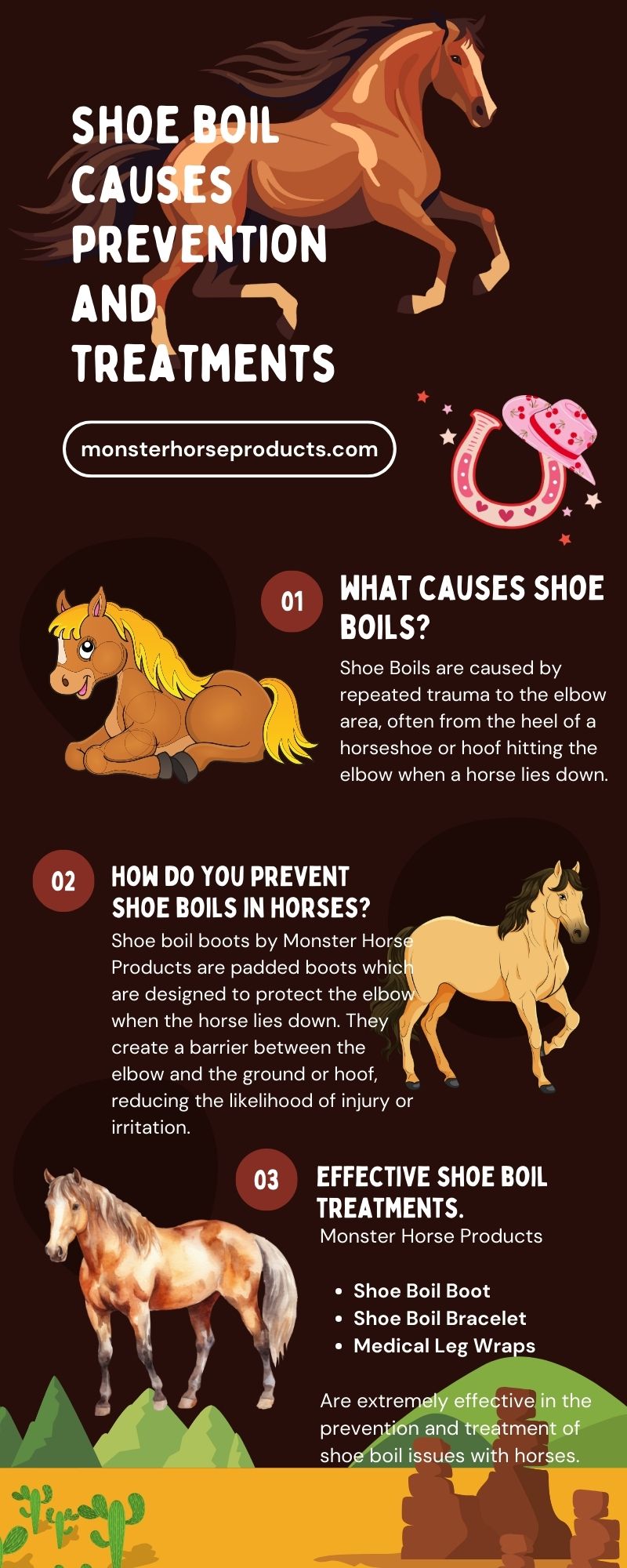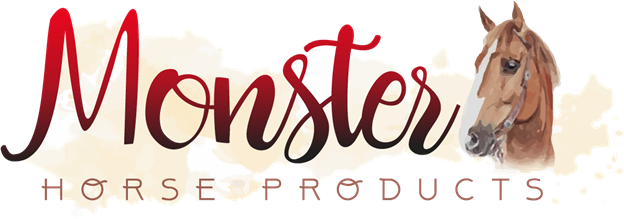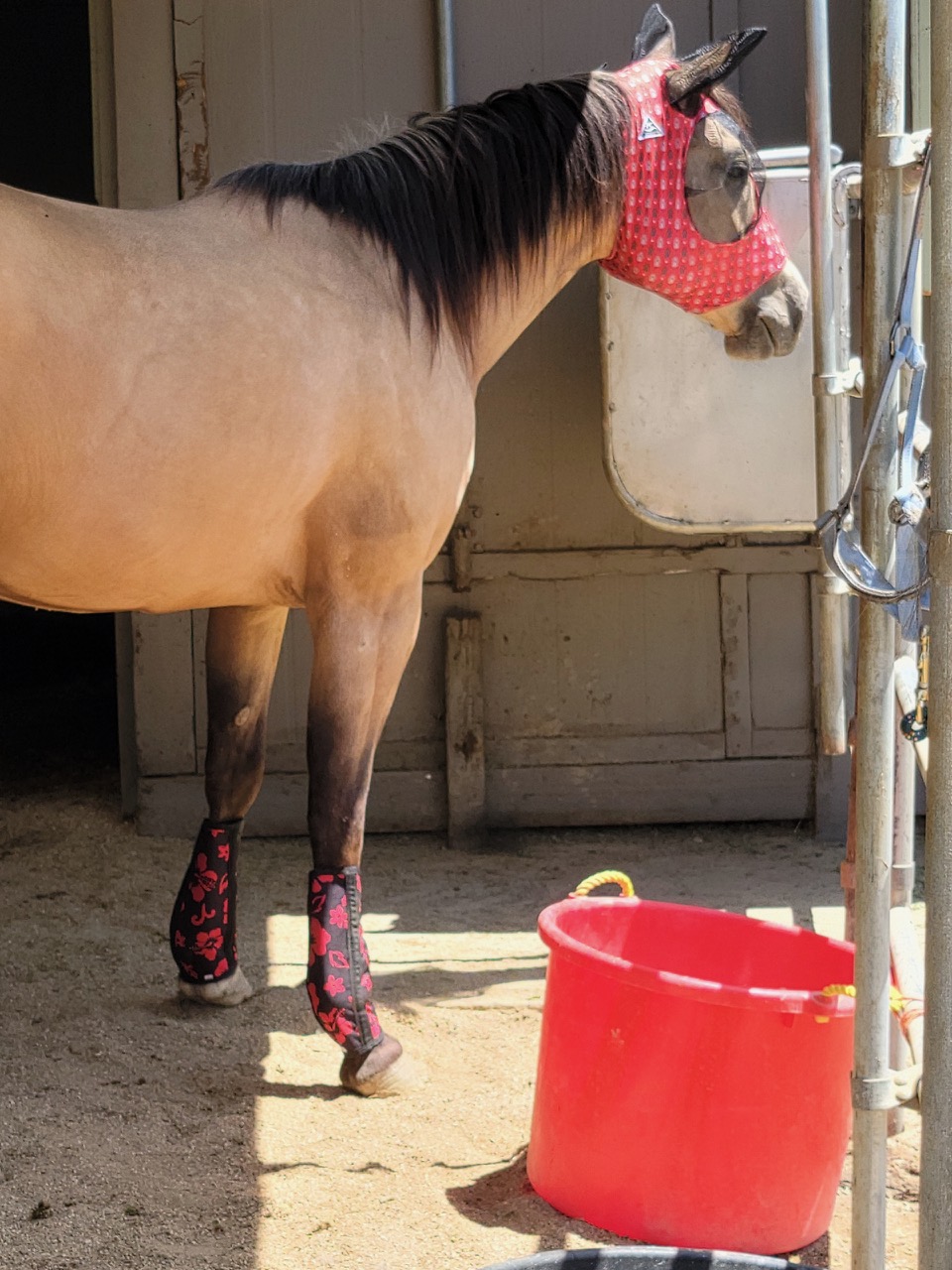Healthy Hooves & Beyond
Monster Featured Friends
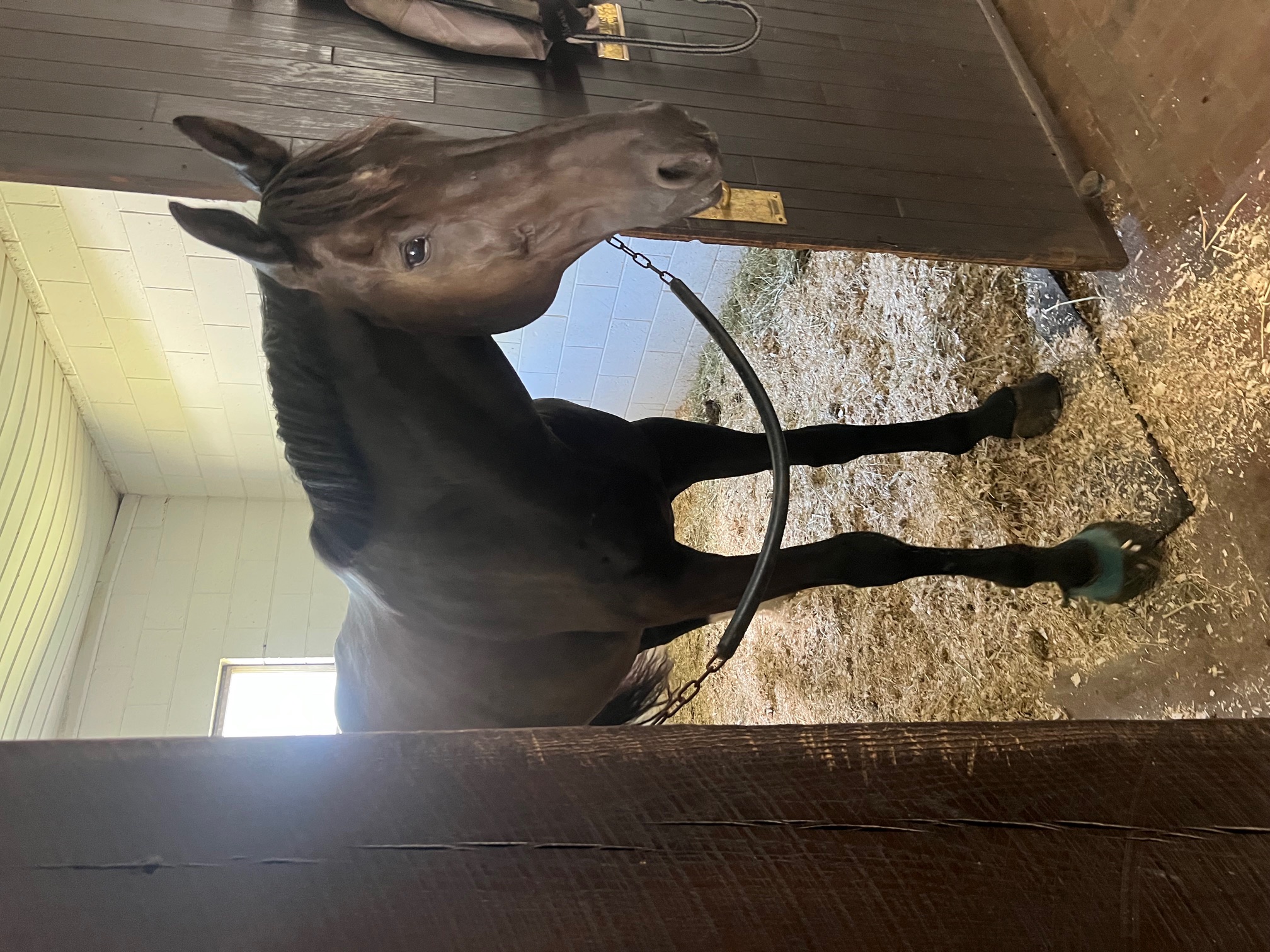
Aramis says thank you for the boot.
It fits like a glove, he loves wearing it and the shoe boil is looking under control.
We appreciate all your help Kim.
- Lidiya and Aramis
Tewksbury NJ
What Are Shoe Boils?
Shoe boils, also known as olecranon bursitis, are fluid-filled swellings that develop on a horse’s elbow. They typically result from repeated trauma, often caused by a horse lying down on hard surfaces or repeatedly pressing its elbow against its hooves. While shoe boils may seem like a minor cosmetic issue at first, they can lead to discomfort, infection, and long-term complications if left untreated.
What Does a Shoe Boil Look Like?
A shoe boil appears as a soft to firm swelling on the back of a horse’s elbow. In the early stages, it may be small and fluid-filled, but over time, it can become thicker, more fibrous, and potentially painful. If infected, the area might feel warm, become abscessed, or even require veterinary intervention.
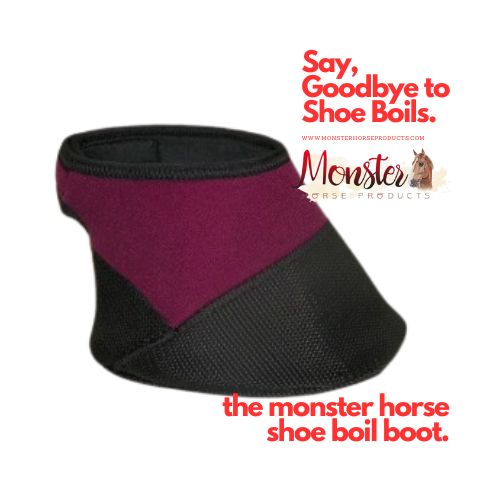
How Do You Treat Shoe Boils?
Effective shoe boil treatment focuses on reducing inflammation, preventing further irritation, and supporting healing. Here’s what you need to do:
-
Provide Soft Bedding – Ensure your horse has deep, cushioned bedding to minimize elbow impact.
-
Drain and Treat (If Needed) – If a shoe boil is infected or large, consult a vet for possible drainage and antibiotic treatment.
-
Use Protective Gear – The best way to prevent and manage shoe boils is by using protective solutions like the Monster Horse Products Shoe Boil Boot, Shoe Boil Bracelet, and Medical Leg Wraps.
How to Get Rid of Shoe Boils
While some minor shoe boils may reduce in size on their own, effective prevention and treatment are key to getting rid of them completely. Using a combination of soft bedding, pressure-relieving boots, and medical wraps will help speed up the healing process.
Can a Shoe Boil Resolve on Its Own?
In some cases, a mild shoe boil may go away over time, but this is not guaranteed. If left untreated, it can harden and become a permanent fibrous lump. Early intervention with protective gear and proper care increases the likelihood of full resolution.
How Do Monster Horse Products’ Shoe Boil Boots Work?
Monster Horse Products offers industry-leading solutions designed to protect your horse’s elbows and prevent further damage. The Monster Shoe Boil Boot works by:
-
Cushioning the Elbow – The boot provides a soft, padded barrier to reduce pressure when lying down.
-
Preventing Recurring Trauma – By eliminating direct contact between the elbow and hoof, it stops the cycle of irritation.
-
Offering All-Day Protection – Designed for comfort and durability, it stays securely in place without restricting movement.
What Is the Monster Horse Shoe Boil Boot?
The Monster Horse Shoe Boil Boot is a lightweight, durable, and comfortable protective boot that shields the horse’s elbow from repeated impact. It’s easy to apply, breathable, and designed to prevent new shoe boils while aiding in the healing of existing ones.
What Is the Monster Horse Shoe Boil Bracelet?
The Monster Horse Shoe Boil Bracelet is a specialized wrap that cushions the elbow and prevents friction against the hoof. It’s particularly useful for horses that already have mild shoe boils and need ongoing protection to prevent further irritation.
How Do Monster Horse Medical Leg Wraps Work?
These medicinal leg wraps are infused with therapeutic materials to reduce inflammation, enhance circulation, and accelerate healing. They are an excellent complementary treatment for horses suffering from shoe boils, capped elbows, or other leg-related swelling.
How to Treat a Capped Elbow in Horses
A capped elbow is similar to a shoe boil but may involve more significant swelling or hardened tissue. Treatment includes:
-
Reducing inflammation with cold therapy or anti-inflammatory medications (consult a vet if needed).
-
Providing a cushioned surface for the horse to rest on.
-
Using Monster Horse Products’ protective gear like the Shoe Boil Boot, Bracelet, or Medical Wraps to prevent further damage.
Conclusion: The Best Solution for Treating and Preventing Shoe Boils
If your horse is dealing with shoe boils, don’t wait until the problem worsens. Investing in Monster Horse Products’ top-rated shoe boil solutions will not only help your horse heal faster but also prevent future issues.
💡 Explore the full range of Monster Horse Products here: Monster Horse Products
By taking proactive steps and using the right protective gear, you can keep your horse comfortable, healthy, and free from painful shoe boils!
Understanding Shoe Boils and Why They Matter
Imagine your horse waking up every morning with a painful swelling on its elbow—something that could have been easily prevented. Shoe boils, also known as olecranon bursitis, are a common yet frustrating condition caused by repeated pressure on the horse’s elbow. While they may start as a minor nuisance, if left untreated, they can lead to chronic discomfort and even lameness.
The good news? There are effective shoe boil solutions that can prevent and treat this condition, ensuring your horse stays comfortable and performing at its best.
What Causes Shoe Boils?
Shoe boils develop when prolonged or repeated pressure irritates the bursa (a fluid-filled sac that cushions joints). This pressure often comes from:
-
Lying on hard surfaces – A horse resting on a hard stall floor can compress the elbow.
-
Ill-fitting shoes or hooves hitting the elbow – Poor hoof care or shoeing can worsen the issue.
-
Lack of proper padding – Horses without adequate stall padding are more susceptible.
-
Repetitive trauma – Continual pressure over time leads to swelling and inflammation.
Shoe Boil Symptoms: When to Take Action
Early detection is key to preventing further complications. Keep an eye out for these shoe boil symptoms:
✅ Soft, fluid-filled swelling on the elbow ✅ Tenderness when touched ✅ Increased swelling after lying down ✅ Difficulty standing up or moving comfortably ✅ In severe cases, hardening of the lump due to fibrosis
Ignoring these signs can lead to chronic bursitis, which may require surgery or more aggressive treatment.
How to Treat Shoe Boils: The Best Solutions
1. Prevention is the Best Cure
The easiest way to deal with shoe boils is to prevent them before they start.
-
Use Protective Gear – High-quality shoe boil boots and bracelets from Monster Horse Products provide cushioning and prevent direct pressure on the elbow.
-
Soft Bedding Matters – A well-padded stall reduces friction and impact.
-
Proper Hoof Care – Keep hooves trimmed to minimize self-inflicted trauma.
2. Treat Shoe Boils Effectively
Already dealing with a shoe boil? Here’s how to treat shoe boils and relieve your horse’s discomfort:
-
Cold Compresses – Reduce initial swelling with ice packs.
-
Topical Medications – Use medicinal leg wraps to reduce inflammation.
-
Padding & Wraps – Soft wraps around the elbow help prevent further irritation.
-
Drainage (For Severe Cases) – Consult a vet if the swelling becomes hard or infected.
3. The Best Shoe Boil Solution: Monster Horse Products
When it comes to shoe boil treatment, investing in the right products can make all the difference. Monster Horse Products offers industry-leading shoe boil protection designed to:
-
Prevent recurring shoe boils
-
Reduce swelling and pain
-
Improve overall horse comfort
Check out Monster Horse Products for a complete range of protective gear and treatment solutions.
Will Shoe Boils Go Away on Their Own?
In some cases, mild shoe boils may resolve naturally if pressure is removed early. However,
